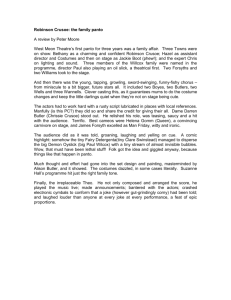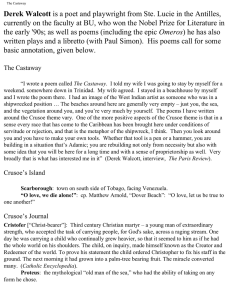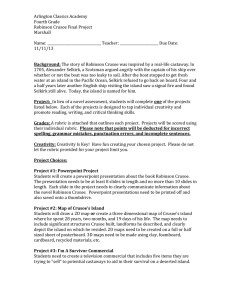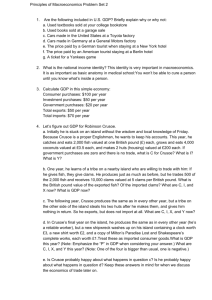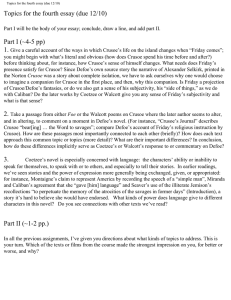Crusoe's Eurocentric Vision of the World
advertisement
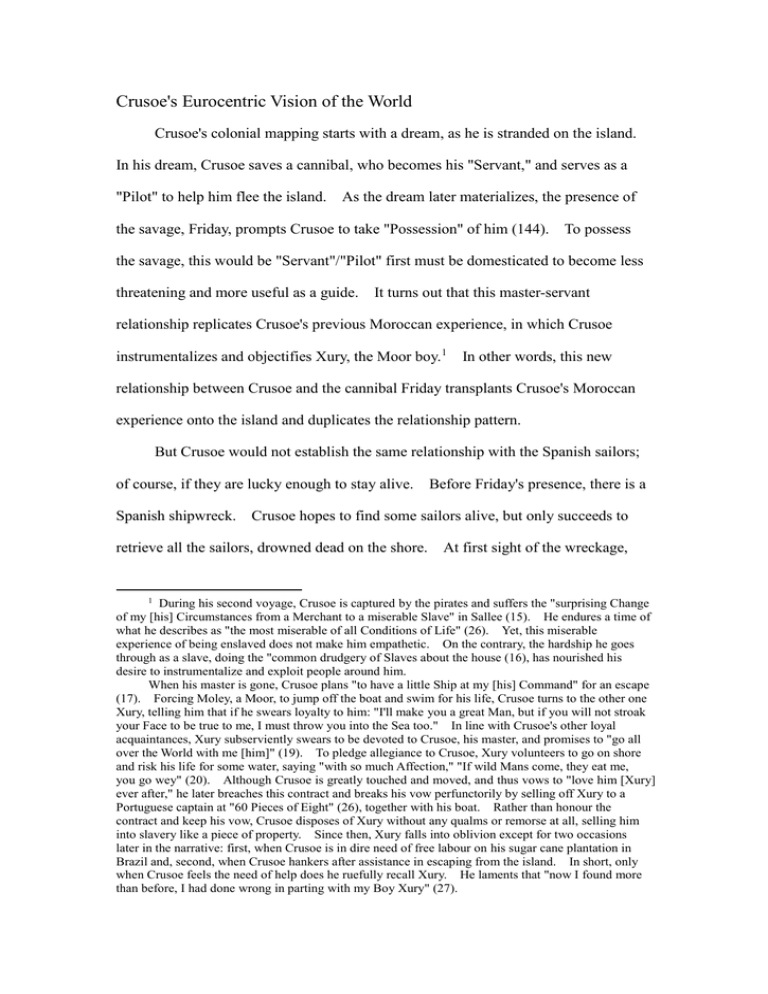
Crusoe's Eurocentric Vision of the World Crusoe's colonial mapping starts with a dream, as he is stranded on the island. In his dream, Crusoe saves a cannibal, who becomes his "Servant," and serves as a "Pilot" to help him flee the island. As the dream later materializes, the presence of the savage, Friday, prompts Crusoe to take "Possession" of him (144). To possess the savage, this would be "Servant"/"Pilot" first must be domesticated to become less threatening and more useful as a guide. It turns out that this master-servant relationship replicates Crusoe's previous Moroccan experience, in which Crusoe instrumentalizes and objectifies Xury, the Moor boy.1 In other words, this new relationship between Crusoe and the cannibal Friday transplants Crusoe's Moroccan experience onto the island and duplicates the relationship pattern. But Crusoe would not establish the same relationship with the Spanish sailors; of course, if they are lucky enough to stay alive. Before Friday's presence, there is a Spanish shipwreck. Crusoe hopes to find some sailors alive, but only succeeds to retrieve all the sailors, drowned dead on the shore. 1 At first sight of the wreckage, During his second voyage, Crusoe is captured by the pirates and suffers the "surprising Change of my [his] Circumstances from a Merchant to a miserable Slave" in Sallee (15). He endures a time of what he describes as "the most miserable of all Conditions of Life" (26). Yet, this miserable experience of being enslaved does not make him empathetic. On the contrary, the hardship he goes through as a slave, doing the "common drudgery of Slaves about the house (16), has nourished his desire to instrumentalize and exploit people around him. When his master is gone, Crusoe plans "to have a little Ship at my [his] Command" for an escape (17). Forcing Moley, a Moor, to jump off the boat and swim for his life, Crusoe turns to the other one Xury, telling him that if he swears loyalty to him: "I'll make you a great Man, but if you will not stroak your Face to be true to me, I must throw you into the Sea too." In line with Crusoe's other loyal acquaintances, Xury subserviently swears to be devoted to Crusoe, his master, and promises to "go all over the World with me [him]" (19). To pledge allegiance to Crusoe, Xury volunteers to go on shore and risk his life for some water, saying "with so much Affection," "If wild Mans come, they eat me, you go wey" (20). Although Crusoe is greatly touched and moved, and thus vows to "love him [Xury] ever after," he later breaches this contract and breaks his vow perfunctorily by selling off Xury to a Portuguese captain at "60 Pieces of Eight" (26), together with his boat. Rather than honour the contract and keep his vow, Crusoe disposes of Xury without any qualms or remorse at all, selling him into slavery like a piece of property. Since then, Xury falls into oblivion except for two occasions later in the narrative: first, when Crusoe is in dire need of free labour on his sugar cane plantation in Brazil and, second, when Crusoe hankers after assistance in escaping from the island. In short, only when Crusoe feels the need of help does he ruefully recall Xury. He laments that "now I found more than before, I had done wrong in parting with my Boy Xury" (27). Crusoe bewails it as a great misfortune, but on second thoughts Crusoe relishes the disaster as a blessing. After all, sharing his island with other European castaways would threaten and jeopardize his dominion. In contrast, Friday, possessed and domesticated, does not pose any threat to Crusoe. Pat Rogers differentiates these two aspects of the same problem: "Friday is acceptable because, for obvious racial reasons, he represents no threat of equality" (389, my emphases). Rogers is right by pointing out the issue of racism at stake, in that Friday's racial inferiority promises peace and acceptance on the island. And it is racial inequality that becomes an imperative for both Xury's and Friday's unconditional loyalty and serves to rationalize Crusoe's superiority. This hierarchy of Crusoe's rationalized superiority and Friday's and Xury's relative inferiority reveals an underlying assumption which confirms the centrality of the European, Crusoe, and the marginality of non-European others, Xury and Friday.2 These two marginalized racial others--a Moroccan and an American cannibal-are instantly infantilized as Crusoe respectively calls Xury and Friday, "my boy" (27) and my "Child" (151), and invariably enslaved as Crusoe claims himself Xury's and Friday's "Master" (149). The former swears to be "faithful" to and "go all over the World with" Crusoe (19), while the latter pledges to protect his master and tell his own people "to live Good," "to pray God," "to eat Corn bread, Cattle-flesh, Milk, no eat Man again," and most importantly to "make they much Love" Crusoe (162). To theorize Crusoe's relations with Xury and Friday, J. M. Blaut's interpretation of "spatial elitism" and the "Inside-Outside model" sheds some light on Crusoe's establishment of master/slave relationship.3 2 In The Colonizer’s Model of the World: The nuance of difference between the two lies in the fact that Crusoe's relationship with Friday eventually evolves into a detailed and full-scaled colonial discourse, taking up the last third of the novel, but that with Xury is only transient and too brief at the beginning of Crusoe's adventures. 3 Trinh T. Minh-ha, in her Woman, Native, Other: Writing Postcoloniality and Feminism, also centers around this dualistic world view of Eurocentrism, "interpreting the out-group through the Geographical Diffusionism and Eurocentric History, Blaut reproves and refutes the time-honoured corpus of European theories, which are firmly embedded in various Western belief systems and which falsely claim that European society and religion are superior to all the other societies and regions of the world (8-9). The corpus is, in a word, Eurocentric and posits itself as a model of the world. This Eurocentric model of the world bases itself on "diffusionism," which diffuses European culture outwardly from Europe, the only centre, to other parts of the World, the periphery. As Blaut interprets, this Eurocentric diffusionism is "spatial elitism" (12), which advocates the "Inside-Outside model" (13). It depicts a world dualistically divided into two divisions, with Greater Europe inside, and non-Europe outside. This Eurocentric model of the world offers theoretical basis, practical strategies of colonial power and knowledge, and the process by which European colonizers, here including Robinson Crusoe, come to understand and enter into their relationships to the rest of the world. Indeed, Richard Phillips also shares a similar idea: Robinson Crusoe takes these elements of Britain, of his British social self, and transplants them to the island, where he amplifies them, in himself and in his engagements with the island. Thus, when Crusoe was removed from society, society was not removed from him. (31) If readers put Robinson Crusoe in Blaut's model, they would identify the protagonist as a faithful practitioner of this Eurocentric "diffusionism," or "spatial elitism." Not only does he relocate "his British social self" and the "elements of Britain" to the in-group mode of reasoning while claiming to speak the minds of both the in-group and the out-group" (1). This "in-group"/"out-group" demarcation of the world is not only compatible with, but also resembles Blaut's "Inside-Outside model." island, he also "amplifies" them on the model of "spatial elitism" or Eurocentrism, by colonizing and inculcating Friday.4 Although he is haplessly uprooted from Britain, Britain is "not removed from him," but is replanted to the island on a prototypical model of empire. 4 In light of it, Peter Hulme comments that Robinson Crusoe did influence the course of British colonialism in a more general way, and Crusoe's island came to be regarded as a more generic, colonial space. Richard Phillips further adds: "Robinson Crusoe represents, promotes and legitimates a form of colonialism" (31). He hammers out a conclusion that "Robinson Crusoe was a map of British imperial geography and a myth of British imperialism" (32).
